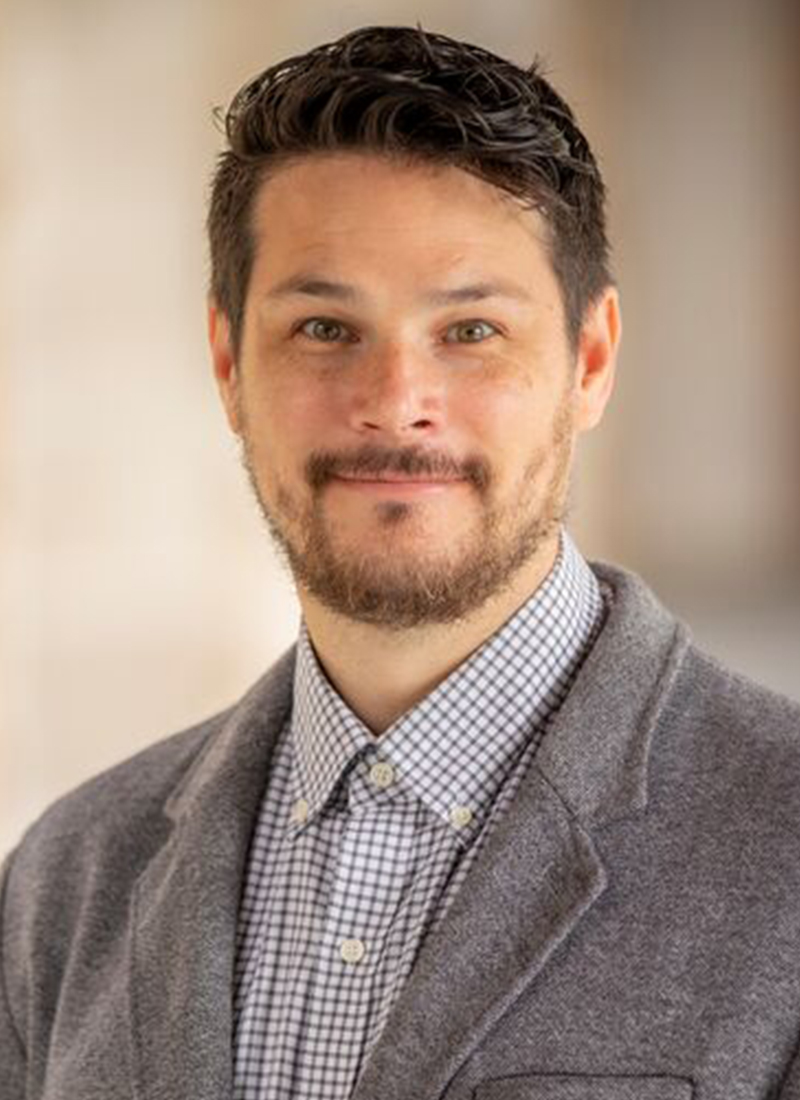Research Interests
Genetics, Molecular Biology, Aging, Skeletal Muscle Biology
Dr. Hunt received his bachelor’s degree from the University of Melbourne, Australia, and subsequently completed a Ph.D. there researching how signaling proteins influence skeletal muscle pathologies and muscle regeneration. He then undertook a postdoctoral research position at St. Jude Children’s Research Hospital in Memphis to study genetic modifiers of muscle growth and aging.
At Rhodes College, Dr. Hunt’s research focuses on an important question: how can we slow declining cellular homeostasis and maintain greater muscle function in old age? As cells in our bodies age, molecular alterations are accumulated that eventually limit cellular homeostasis and function, and lead to visible signs of aging that limit quality of life. Dr. Hunt utilizes Drosophila Melanogaster (fruit fly) genetic models to identify evolutionarily conserved genes and molecular pathways that contribute to declining skeletal muscle function and aging.
The fruit fly is an excellent model system to answer this question because genes are generally well conserved from flies to humans, they have a short life-cycle amenable to rapid testing even in the context of aging, and a strong history in biological research that has led to libraries of genetic variants and transgenic flies becoming available to test. In the Hunt Lab ongoing research projects that students can participate in include:
Elucidating novel mechanisms regulating transcriptional responses and animal survival during heat stress within muscle cells of Drosophila Melanogaster – This project studies the molecular mechanisms regulating transcription and expression of heat stress responsive genes, which are more highly expressed in skeletal muscle as the cells age. The Hunt lab utilizes a cell specific expression system to silence genes only in adult skeletal muscle cells of flies and examines changes in heat responsive gene transcription and how this impacts animal survival and muscle function during heat stress.
Epigenetic modification as a regulator of skeletal muscle function and aging – This project aims to determine whether changes in chromatin state and gene expression, caused by epigenetic modifications such as histone acetylation and methylation lead to the age associated decline in skeletal muscle function. The Hunt lab utilizes a range of genetic tools in flies including reporters of Position Effect Variegation that can report on gene expression from non-permissive chromatin at certain chromosomal loci, genomic mutations, and cell specific expression to understand how epigenetic modifications regulate chromatin state, gene expression and subsequently impact skeletal muscle function.
If you are interested in participating in undergraduate research with Dr. Hunt, please contact him by email.
Selected publications (* denotes undergraduate student authors/contributors)
The ubiquitin-conjugating enzyme UBE2D/eff maintains a youthful proteome and ensures protein quality control during aging
LC Hunt, K Nyamkondiwa*, A Stephan, J Jiao, K Kavdia, V Pagala, J Peng, F Demontis
bioRxiv 2024
An adaptive stress response that confers cellular resilience to decreased ubiquitination
LC Hunt, V Pagala, A Stephan, B Xie, K Kodali, K Kavdia, YD Wang, A Shirinifard, M Curley, FA Graca, Y Fu, S Poudel, Y Li, X Wang, H Tan, J Pen, F Demontis
Nature Communications 2023
Age-Related Increase in Lactate Dehydrogenase Activity in Skeletal Muscle Reduces Life Span in Drosophila
LC Hunt, F Demontis
The Journals of Gerontology 2022
A large-scale transgenic RNAi screen identifies transcription factors that modulate myofiber size in Drosophila
FA Graca, N Sheffield*, M Puppa, D Finkelstein, LC Hunt, F Demontis
PLoS Genetics 2021
Integrated genomic and proteomic analyses identify stimulus-dependent molecular changes associated with distinct modes of skeletal muscle atrophy
Liam C Hunt, Flavia A Graca, Vishwajeeth Pagala, Yong-Dong Wang, Yuxin Li, Zuo-Fei Yuan, Yiping Fan, Myriam Labelle, Junmin Peng, Fabio Demontis
Cell reports 2021
Antagonistic control of myofiber size and muscle protein quality control by the ubiquitin ligase UBR4 during aging
Liam C Hunt, Bronwen Schadeberg*, Jared Stover*, Benard Haugen*, Vishwajeeth Pagala, Yong-Dong Wang, Jason Puglise, Elisabeth R Barton, Junmin Peng, Fabio Demontis
Nature communications 2021
A key role for the ubiquitin ligase UBR4 in myofiber hypertrophy in drosophila and mice
Liam C Hunt, Jared Stover*, Benard Haugen*, Timothy I Shaw, Yuxin Li, Vishwajeeth R Pagala, David Finkelstein, Elisabeth R Barton, Yiping Fan, Myriam Labelle, Junmin Peng, Fabio Demontis
Cell reports 2019
Circadian gene variants and the skeletal muscle circadian clock contribute to the evolutionary divergence in longevity across Drosophila populations
Liam C Hunt, Jianqin Jiao, Yong-Dong Wang, David Finkelstein, Deepti Rao, Michelle Curley, Maricela Robles-Murguia, Abbas Shirinifard, Vishwajeeth R Pagala, Junmin Peng, Yiping Fan, Fabio Demontis
Genome Research 2019
The glucose-sensing transcription factor MLX promotes myogenesis via myokine signaling
Liam C Hunt, Beisi Xu, David Finkelstein, Yiping Fan, Patrick A Carroll, Pei-Feng Cheng, Robert N Eisenman, Fabio Demontis
Genes & Development 2015
Complete list of publications
